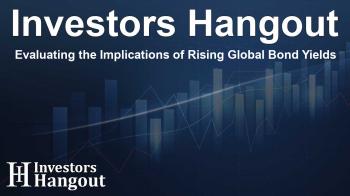Evaluating the Implications of Rising Global Bond Yields

The Rising Tide of Global Bond Yields
Recent discussions have surfaced about the sustainability of escalating global bond yields, alongside their potential ramifications for financial markets and economies. This trend reflects complex dynamics that are shaping the current economic landscape.
Understanding the Factors Behind Increased Yields
Although short-term factors may support elevated yields, many analysts project that cyclical and structural shifts will ultimately lead to stabilization. According to insights from BCA Research, the rise in bond yields can be attributed to an intricate interplay of various elements fuelled by changes in monetary policies.
Notably, adjustments in market expectations regarding monetary policy have emerged as a significant driver of this trend. Investors are reassessing the timeline and nature of future rate hikes, which has resonated through both developed and emerging markets.
The Global Resonance of Yields
It's intriguing to note how the long end of the yield curve has started to diverge from immediate policy expectations. This change signals a growing focus on term premiums, shaped by factors like inflation anxiety and government funding concerns. BCA Research indicates that much of the recent uptick in yields is tied to adjustments in risk premiums.
Countries grappling with current account deficits, including the United States and the United Kingdom, have felt the impact more acutely than those with surplus economies, such as Germany and Japan. This divergence highlights that investors are weighing fiscal vulnerabilities and the essential need for external financing, which may further heighten bond market volatility.
Cautious Optimism for Government Bonds
Despite facing such challenges, experts maintain a cautiously optimistic outlook for government bonds in the medium term. BCA Research emphasizes that the self-regulating nature of higher yields tends to suppress both growth and inflationary pressures.
Increased borrowing costs are already evident, straining sectors sensitive to interest rates. For instance, the housing market and corporate finance sectors are experiencing reduced activity, with a notable uptick in refinancing difficulties for borrowers. Such trends align with expectations for a slowing economic growth trajectory, which is expected to apply downward pressure on yields.
Identifying Opportunities in Government Bonds
Regionally, BCA identifies opportunities within certain government bonds, especially those from economies characterized by higher risk premiums and weaker growth outlooks. The UK, for instance, distinguishes itself as a potentially attractive market despite recent yield increases. Analysts believe that the current selloff in UK gilts stems from broader global phenomena rather than isolated domestic instability.
The heightened risk profile of UK bonds, coupled with the cyclical weaknesses in its economy, offers a persuasive risk-reward scenario for investors. Meanwhile, in the United States, prevailing inflation uncertainty remains a pivotal concern, with the Federal Reserve expressing increasing apprehension regarding long-term price stability, which has contributed to rising term premiums.
The Wider Economic Impact of Rising Yields
Rising global bond yields send ripples throughout the economy. As yields climb and the U.S. dollar strengthens, emerging markets, particularly those financing debt in dollars, face significant challenges. Furthermore, tighter financial conditions are poised to impair global trade and investment flows, magnifying risks to economic growth.
BCA Research encourages a defensive approach for fixed income portfolios, with an emphasis on managing duration and making selective commitments to government bonds. Despite potential immediate fluctuations, BCA highlights the enduring value of bonds in a landscape of slowing growth and diminishing inflation.
Frequently Asked Questions
What are global bond yields?
Global bond yields refer to the interest rates that governments pay to borrow money through bonds, reflecting the return investors earn when they purchase those bonds.
What factors influence the rise in bond yields?
Factors include shifts in monetary policy, inflation expectations, risk premiums, and the economic performance of borrower countries.
How do rising bond yields affect the economy?
Higher bond yields can constrain borrowing costs, affecting consumer spending, investment decisions, and overall economic growth.
What is the outlook for government bonds?
The outlook for government bonds remains cautiously optimistic due to the self-regulating nature of higher yields, which may eventually dampen inflation and support growth.
Why are some economies experiencing higher yield increases than others?
Countries with current account deficits often see more pronounced yield increases as investors factor in higher fiscal vulnerabilities and the need for external financing.
About The Author
Contact Thomas Cooper privately here. Or send an email with ATTN: Thomas Cooper as the subject to contact@investorshangout.com.
About Investors Hangout
Investors Hangout is a leading online stock forum for financial discussion and learning, offering a wide range of free tools and resources. It draws in traders of all levels, who exchange market knowledge, investigate trading tactics, and keep an eye on industry developments in real time. Featuring financial articles, stock message boards, quotes, charts, company profiles, and live news updates. Through cooperative learning and a wealth of informational resources, it helps users from novices creating their first portfolios to experts honing their techniques. Join Investors Hangout today: https://investorshangout.com/
The content of this article is based on factual, publicly available information and does not represent legal, financial, or investment advice. Investors Hangout does not offer financial advice, and the author is not a licensed financial advisor. Consult a qualified advisor before making any financial or investment decisions based on this article. This article should not be considered advice to purchase, sell, or hold any securities or other investments. If any of the material provided here is inaccurate, please contact us for corrections.

